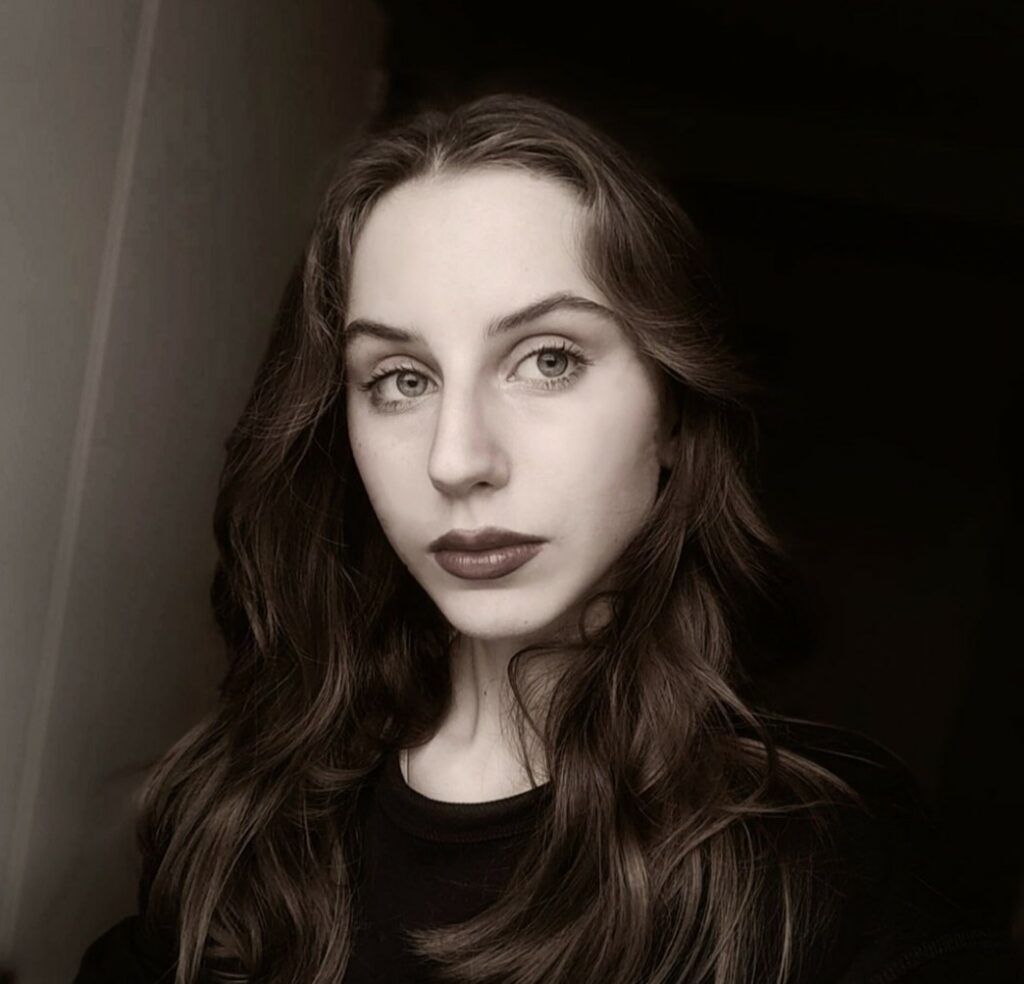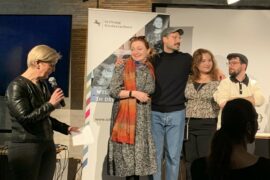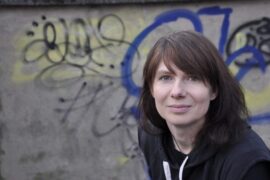Thaumatropes, a chapbook published by Newcomer Press in the summer of 2023, is an experimental poetry collection blending traditional and daring styles, including prose and collage poems. It features multilingual content and explores themes of communication, love, and alienation through a lyrical dialogue between co-authors Sofija Popovska and Jonah Howell, engaging the reader in an open-ended experiment. The following is an interview with the co-authors, where they discuss their influences, thematic choices, and stylistic decisions.
Interview by Cemal Can Özmumcu
Picture: Tim Wood
Your poetry reflects several literary eras, such as modernism and postmodernism. Could you share more about the specific influences that have shaped your thematic choices and stylistic decisions?
Sofija Popovska: I was preparing to write my bachelor’s thesis on the use of ellipses to convey ambiguity in Russian and North American modernist poetry at the moment when most of these poems were created, and I think that’s probably the most obvious set of influences in the book. There’s some T. S. Eliot, some Djuna Barnes. Then there are bits I picked up from Greek mythology, ancient Roman rhetoric, the Bible, and The Pilgrim’s Tale – a little story about a wandering Russian monk who prays ceaselessly instead of thinking – and even some psychoanalysis, mainly Freud and Lacan. The more abrupt-sounding poems are inspired by Russian Futurism and the vaguely nauseating ones by William Burroughs and Georges Bataille (two authors that Jonah introduced me to, for which I am eternally grateful).
Reihe
Literarisches Schreiben neben Studium oder Beruf – wie geht das? Und welche Publikationsmöglichkeiten gibt es? Diese Fragen wollen wir beleuchten und führen dafür Interviews mit Autor:innen an der Uni Göttingen. Ihr habt Lust, euch einzubringen, ob als Interviewte:r oder als Reporter:in? Dann schreibt einfach eine Mail an info@litlog.de!
Jonah Howell: Likewise, I’d just gotten done writing a real long piece on William Burroughs and was about to start teaching T. S. Eliot and Samuel Beckett in the States, so those were very much at the front of my mind. (I probably think of Ezra Pound’s margin note to Eliot, in praise of directness, »Perhaps be DAMNED,« more than any other single sentence.) I admire to no end the rhythms of Gertrude Stein and Gerard Manley Hopkins. And Sophia had just introduced me to the work of Alexander Vvedensky (for which I am eternally grateful), the subtly cyclic repetitions of which were of no small influence.
Your metaphors have a distinct quality reminiscent of John Ashberry and T. S. Eliot, as you already mentioned. How do you balance the inspiration from these poets while crafting your own voice?
S.P.: I don’t look for balance, to be honest – my work with literary fragments is less akin to inspiration than it is to stealing shamelessly, which is a lot more fun, as long as it is blatant enough to not become plagiaristic. Perhaps I should say borrow – the quotations remain recognizable enough in the text, and will ‘return’ to the oeuvre where they originated after they’ve done their semiotic work in my poems. I like to think they return changed, though, tainted with the new meanings they had acquired in the process, like a miniature version of Eliot’s literary tradition.
J.H.: Sofija’s right. Highway robbery – Harold Bloom’s »anxiety of influence« be DAMNED. The best poems put the »play« in »plagiarism« – Eliot’s theft from Hinduism and Frazer’s The Golden Bough for The Waste Land is a great example. The best pickpockets, and criminals in general, leave a sort of calling-card, a methodological fingerprint that can’t be found by dusting but tells everyone but the cops who did the deed. A poetic voice comes the same way: You steal in broad daylight, you shout »this is a holdup« in a crowded avenue, but the way you do it leaves no doubt as to the author.
For example, This is the opening of »Exodus,« part VI of the series »Transatlantic Accent: Noumenopathy«:
Ariadne finds a shovel and digs,
compelled by cruel geometry.
All her bones are poured out like waterinto disjoint time. Its labyrinth straight down
in rivulets and pouts of rust.
These lines cobble together pieces of Georges Bataille’s »The Solar Anus« (Ariadne as the representative of our experiences of time and compulsion), Psalm 22 (»I am poured out like water, and all my bones are out of joint«), and Jorge Luis Borges’ »Death and the Compass« (the straight labyrinth).
Religious imagery plays an important role in your poetry. Biblical characters such as Judas and Lazarus become personas in your poems. It seems that you hold them as universal, cultural archetypes. Is there any particular reason for your inclination toward choosing Biblical elements?

S.P.: My use of Biblical characters is as personal as it is half-baked (which is to say, extremely so in both cases). I met these characters, especially Judas and Mary Magdalene, second-hand, via the work of Mikhail Bulgakov (The Master and Margarita) and Walter Jens (Der Fall Judas) first, and in the Bible only later, when I finally became too ashamed to keep referencing a book I’d never read. They’re far from universal; in fact, I’m sure the way I’ve recast them might seem blasphemous to some readers, but they stood out to me because they seemed like the perfect candidates to portray love that feels doomed from the start. Judas is destined to become a traitor via a divine plan, and all Mary Magdalene gets after being the first to witness Jesus’ resurrection was an »ew, don’t touch me, and go tell the guys I’m back.« The vibes fit in perfectly with the overarching isolation that defined the pandemic years.
J.H.: Sis, same, but opposite. I grew up with the Bible, in church most of the week, and ended up getting ordained just before Sophia and I met. Then she showed me Walter Jens’ book, and we spent quite a lot of time walking around the woods outside Göttingen as she explained to me Bulgakov’s construction of a new type of Devil, and I talked about the Biblical forerunners. So once we started this book, these Biblical characters and scenes were a mutually constructed, shared language, like the weird gravitational wobbles of binary stars: Reflective of more universal archetypes, sure, but also very particular to us.

The meticulous layout of your poems suggests a strong interplay between form and content. Could you elaborate on your approach to balancing these two aspects in your poetry?
S.P.: As is usually the case among poets nowadays, my main goal was to create participatory poems, whose meaning, while suggested by their atmosphere, remains to be decided by the reader. My means of getting there was by creating ambiguity both thematically and stylistically – the characters and scenes are fluid and dreamlike, and the textual form is fraught with ellipses, puns, and unconventional layout choices. These choices make the poems harder to read, but they’re also a way to relinquish authorial control over the situation, to let readers make the text their own. The best-case scenario, the one I was hoping for as I was writing, was to subject these poems to the readers’ continuous productive misunderstanding – after all, miscommunication is what makes a conversation take new directions until the original intent of what was being said pales in comparison to the complexity and depth of the meaning arrived at. In a way, this type of reading resembles a lovers’ discourse, where mistakes illuminate underexplored intensities.
J.H.: The separation between form and content is the kind of thing folks can think about when there’s a strong, more-or-less dominant poetic culture that determines what predetermined forms are available (the older primacy of the sonnet, for example). But there’s no such thing now, far as I know, so form can’t help but be an aspect of content and vice versa. I’m overjoyed Sophia mentioned the importance of puns to this, because they’re the words that make it impossible to differentiate form from content. A pun cuts through the idea that a single word, or a rhythm, or a rhyme relates to only one other word or meaning – and when a pun tears open the linguistic field like that, forcing to mind the fact that each element of a poem can point at any number of others, the networked, rather than neatly categorizable, nature of the poem comes aggressively to the fore. »Productive misunderstanding« is a great phrase for this, but maybe I’d switch it to »productive understanding of necessary uncertainties.«
What is your routine for poetry? Do you rely more on spontaneous inspiration or deliberate observation?
S.P.: When I find a word that I like, other verses usually follow by association. After that I add bits that I’d arrived at by thinking previously, but I often end up deleting these, or cutting them down to a minimum, to avoid making my poems sound like pamphlets or coffee shop rants.
J.H.: I generally start with some rhythm or meter and a compulsion to a certain density of repetitions, then find the words that fit in that nexus. Once the first few lines are down, it becomes something more like Sophia said – piggy-back riding intuition on the lines of association from one line to the next, following the best available pun, then cutting to no more than the necessary redundancies.
Can you talk about your revision process? How much do your poems tend to change from their initial drafts?
S.P.: Sometimes I end up keeping as little as three lines from a poem spanning several pages, sometimes I make no changes at all. In every case, though, I prefer to consult with other people (usually, other poets) when it comes to the editing process. As an aside, my favorite type of person is one who can delete chunks of my poetry without compunction – I’m always on the lookout for someone who will be the Ezra Pound to my T. S. Eliot.
J.H.: I can add nearly nothing to that. Many of the poems in this book went through five, six, seven drafts, and we back-and-forthed and riffed on each other’s lines for a good long while. Although on some poems I’ve got the dirty habit of loyalty to the raw first thought, which Sophia, in the course of creating this book, helped me to break, for the most part.
Working with a co-author must have been a unique experience. How did this collaboration influence the structure and thematic unity of Thaumatropes?
S.P.: Thaumatropes started from a habit I and Jonah had developed of exchanging poems inspired by bits and pieces of each others’ work, or by texts we were reading at the same time – the collaboration is less of an influence on- and more so the primary structuring principle of the work. This book is, at its core, a stylized conversation – between us, between us and the authors we borrow/steal from, and between us and the readers.
J.H.: Exactly that. You’ll notice many, many lines from one of our poems making its way into the other’s. That’s the clearest proof-of-concept. The collaboration isn’t just a co-writing, like we each wrote some poems and organized them together, but really a labor of volleying one mind into another and back until we’d built up such velocity that the writing became a thaumatrope (a disk with two pictures on it that, when you spin it fast enough, seem to merge). That’s why, after Sophia taught me the word and showed me a video of one, we chose that title. It’s the process, the form, and the content of the thing – which, like she said, now becomes the form of the exchange between us and y’all, who are reading it.






